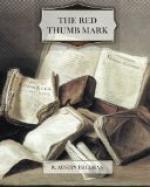“No, I suppose not,” I answered tentatively.
“You suppose not!” he replied. “Why here is as pretty a little problem as you could desire—what would be called in the jargon of the novels, a psychological problem—and it is your business to work it out, too.”
“You mean as to Miss Gibson’s relations with these two young men?”
Thorndyke nodded.
“Is it any concern of ours?” I asked.
“Certainly it is,” he replied. “Everything is a concern of ours at this preliminary stage. We are groping about for a clue and must let nothing pass unscrutinised.”
“Well, then, to begin with, she is not wildly infatuated with Walter Hornby, I should say.”
“No,” agreed Thorndyke, laughing softly; “we may take it that the canny Walter has not inspired a grand passion.”
“Then,” I resumed, “if I were a suitor for Miss Gibson’s hand, I think I would sooner stand in Reuben’s shoes than in Walter’s.”
“There again I am with you,” said Thorndyke. “Go on.”
“Well,” I continued, “our fair visitor conveyed to me the impression that her evident admiration of Reuben’s character was tempered by something that she had heard from a third party. That expression of hers, ‘speaking from my own observation,’ seemed to imply that her observations of him were not in entire agreement with somebody else’s.”
“Good man!” exclaimed Thorndyke, slapping me on the back, to the undissembled surprise of a policeman whom we were passing; “that is what I had hoped for in you—the capacity to perceive the essential underneath the obvious. Yes; somebody has been saying something about our client, and the thing that we have to find out is, what is it that has been said and who has been saying it. We shall have to make a pretext for another interview with Miss Gibson.”
“By the way, why didn’t you ask her what she meant?” I asked foolishly.
Thorndyke grinned in my face. “Why didn’t you?” he retorted.
“No,” I rejoined, “I suppose it is not politic to appear too discerning. Let me carry the microscope for a time; it is making your arm ache, I see.”
“Thanks,” said he, handing the case to me and rubbing his fingers; “it is rather ponderous.”
“I can’t make out what you want with this great instrument,” I said. “A common pocket lens would do all that you require. Besides, a six-inch objective will not magnify more than two or three diameters.”
“Two, with the draw-tube closed,” replied Thorndyke, “and the low-power eye-piece brings it up to four. Polton made them both for me for examining cheques, bank-notes and other large objects. But you will understand when you see me use the instrument, and remember, you are to make no comments.”
We had by this time arrived at the entrance to Scotland Yard, and were passing up the narrow thoroughfare, when we encountered a uniformed official who halted and saluted my colleague.




